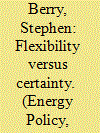|
|
|
Sort Order |
|
|
|
Items / Page
|
|
|
|
|
|
|
| Srl | Item |
| 1 |
ID:
168649


|
|
|
|
|
| Summary/Abstract |
Globally, building energy regulation has been an effective policy instrument for reducing energy use and carbon emissions. In Australia, the majority of regions address building performance through the National Construction Code. However, in 2004 the New South Wales government introduced a planning instrument called the ‘Building Sustainability Index’, known as BASIX. Until now there has been limited investigation of this sustainability index approach compared with addressing issues individually through building standards. This paper presents analysis of 94,648 building energy assessments in New South Wales and 190,286 from other Australian states to explore the impact of BASIX. The results show that the building code process delivers greater certainty and higher performance than through the sustainability index. The analysis shows that 58% of homes that pass BASIX would fail the National Construction Code for thermal comfort, and that the process of improving performance through the index is more cumbersome and slower than through individual building standards. Given the need to progressively increase house energy standards, governments should be seeking both certainty and higher performance outcomes. Failure to deliver community expected minimum performance risks locking in poor performance for long-life assets, and condemning a generation of households to unnecessarily higher energy bills.
|
|
|
|
|
|
|
|
|
|
|
|
|
|
|
|
| 2 |
ID:
125760


|
|
|
|
|
| Publication |
2013.
|
| Summary/Abstract |
Energy use in residential buildings is a significant contributor to global carbon emissions. The South Australian Government responded to concern for anthropogenic greenhouse gas emissions by creating a model development of near zero energy homes in a near zero carbon impact estate. The creation of the Lochiel Park Green Village challenged a collective of industry experts and policy makers to set objectives, performance targets and regulatory guidelines outside existing institutional and professional norms. Literature suggests that the creation of niche events can help the transition away from dominant technologies, practices and beliefs, and lead to organisations embracing new tools, construction practices, technologies, standards and policies. By applying a multi-level socio-technical framework, and utilising evidence collected from a series of interviews with key government and industry leaders, this paper examines how, under the influence of landscape pressures, structural change at the regime level can come from the incubation of ideas and experiences at the niche level. The available evidence finds that the creation of the Lochiel Park Green Village has allowed many individuals and organisations to gain a more detailed and practical understanding of sustainable housing, and has given organisations the confidence to change industry practices, government policies, and regulatory standards.
|
|
|
|
|
|
|
|
|
|
|
|
|
|
|
|
|
|
|
|
|